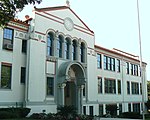Smoky Hollow Historic District
Big Bend Region, Florida Registered Historic Place stubsHistoric districts on the National Register of Historic Places in FloridaLeon County, Florida geography stubsNRHP infobox with nocatNational Register of Historic Places in Tallahassee, Florida ... and 4 more
Neighborhoods in Tallahassee, FloridaTallahassee, Florida stubsUse mdy dates from August 2023Vernacular architecture in Florida

The Smoky Hollow Historic District is a U.S. historic district (designated as such on October 27, 2000) located in Tallahassee, Florida. The district is bounded by East Lafayette Street, CSX RR tracks, Myers Park and Myers Park Lane. It contains 14 historic buildings and 3 structures. On January 14, 2009, a decrease in the district's boundary was implemented.
Excerpt from the Wikipedia article Smoky Hollow Historic District (License: CC BY-SA 3.0, Authors, Images).Smoky Hollow Historic District
Myers Park Lane, Tallahassee
Geographical coordinates (GPS) Address Nearby Places Show on map
Geographical coordinates (GPS)
| Latitude | Longitude |
|---|---|
| N 30.436388888889 ° | E -84.271944444444 ° |
Address
Myers Park Lane 1005
32301 Tallahassee
Florida, United States
Open on Google Maps










